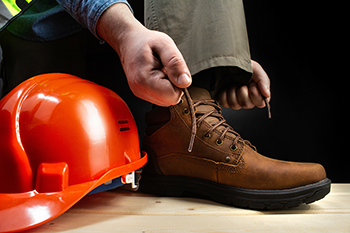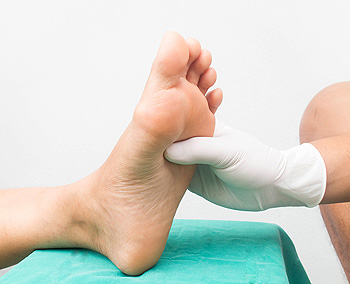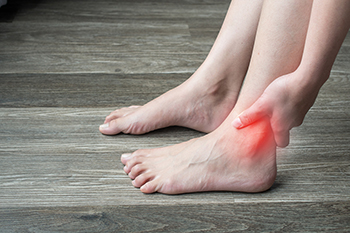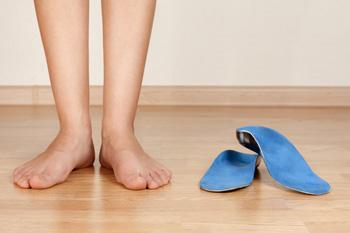Items filtered by date: January 2023
Stress Mats May Help the Feet

There are many professions including the medical field, retail positions, and the restaurant industry that require standing for most of the day. The feet endure the weight of the body, and this can result in foot pain at the end of the day. This may be prevented by wearing shoes that fit correctly, and elevating the feet as often as possible. Additionally, it is beneficial to stand on a stress mat, which can provide cushioning for the overall body. The feet are considered to be the foundation of the body, and maintaining proper foot care while standing or walking may help to reduce the risk of incurring painful conditions. Crooked or misaligned feet may happen from wearing the wrong shoes, which may gradually lead to developing joint pain in other parts of the body. It is beneficial for patients who notice their feet are tender and achy to take prompt action in protecting their feet while working. If you would like more information about effective methods on how to care for your feet during the workday, please consult with a podiatrist.
While working on the feet, it is important to take the proper care of them. For more information about working on your feet, contact Kenneth Donovan, DPM from Advanced Care Foot and Ankle. Our doctor will treat your foot and ankle needs.
Working on Your Feet
Standing on your feet for long periods of time can cause stress and pain in your feet. Your whole body may experience change in terms of posture, back pain, bunions, callouses and or plantar warts. There are ways to avoid these conditions with proper foot care, smart choices and correct posture.
Positive Changes
Negative heeled shoe – Choosing this shoe type places the heel slightly lower than the ball of the foot. These are great for overall foot health. Find shoes that fit you correctly.
Go barefoot – Our feet were not designed to be enclosed for all hours of the day. Try to periodically expose your feet to air.
Eliminate Pain
Foot Exercises – Performing simple exercises, incorporating yoga and doing stretches are beneficial. This will allow increased blood flow to the area and muscles of the foot.
Achilles tendon – Stretching the foot out flat on the floor will relax the calf muscles and tendon. These exercises can be performed almost anywhere. Make sure you add these exercises to your daily regimen.
With a little bit of this information and knowing more about foot health, you will notice changes. Foot stretches and proper footwear will help with pain and prevent further issues.
If you have any questions please feel free to contact our office located in Charleston, SC . We offer the newest diagnostic and treatment technologies for all your foot and ankle needs.
Open Wounds May Be Common Among Diabetic Patients

Recent studies have shown that approximately 10 percent of the American population has diabetes. Many of these are seniors, and other health issues may arise from the disease. Diabetic patients need their feet to be looked after and cared for daily, and this can begin by examining the bottom of the feet using a mirror. A family member or health care provider may be able to accomplish this exam, which is effective in noticing existing cuts, bruises, or scrapes that are on the feet. A common condition that diabetic patients can develop is a foot ulcer, and this happens when a cut is unnoticed as a result of neuropathy. This is the inability to feel sensations on the feet, which may cause a small cut to become infected, and often requires prompt medical treatment. An open sore may require an X-ray to be performed, to observe if it has spread to the bone. Washing and drying the feet in addition to cutting the toenails properly are part of good diabetic foot care habits. If you would like more information about diabetic foot care tips, please consult a podiatrist who can help you to manage this condition.
Diabetic foot care is important in preventing foot ailments such as ulcers. If you are suffering from diabetes or have any other concerns about your feet, contact Kenneth Donovan, DPM from Advanced Care Foot and Ankle. Our doctor can provide the care you need to keep you pain-free and on your feet.
Diabetic Foot Care
Diabetes affects millions of people every year. The condition can damage blood vessels in many parts of the body, especially the feet. Because of this, taking care of your feet is essential if you have diabetes, and having a podiatrist help monitor your foot health is highly recommended.
The Importance of Caring for Your Feet
- Routinely inspect your feet for bruises or sores.
- Wear socks that fit your feet comfortably.
- Wear comfortable shoes that provide adequate support.
Patients with diabetes should have their doctor monitor their blood levels, as blood sugar levels play such a huge role in diabetic care. Monitoring these levels on a regular basis is highly advised.
It is always best to inform your healthcare professional of any concerns you may have regarding your feet, especially for diabetic patients. Early treatment and routine foot examinations are keys to maintaining proper health, especially because severe complications can arise if proper treatment is not applied.
If you have any questions please feel free to contact our office located in Charleston, SC . We offer the newest diagnostic and treatment technologies for all your foot and ankle needs.
Twisting Your Ankle

A twisted ankle, or an ankle sprain, leads to overstretching or tearing of a ligament around the ankle. Ankle sprains make up 85% of ankle injuries. Such sprains usually occur from a sports injury, walking or running on uneven ground, or wearing high heels. Sprains can recur, so making sure to heal properly from a sprained ankle is important. If an ankle twists suddenly, it can force the foot outside its normal range of motion and place stress on the ligaments. When stretched beyond its normal limits, the ligament can start to tear. Torn ankle ligaments are most likely to occur in those under 30 years of age, regardless of gender. There will be mild to significant pain, swelling, and bruising depending on the severity of the sprain. The ability to walk will also be related to the grade of the sprain incurred. If you are having ankle pain after twisting your ankle, see a podiatrist for a proper diagnosis and treatment options.
Ankle pain can be caused by a number of problems and may be potentially serious. If you have ankle pain, consult with Kenneth Donovan, DPM from Advanced Care Foot and Ankle. Our doctor will assess your condition and provide you with quality foot and ankle treatment.
Ankle pain is any condition that causes pain in the ankle. Due to the fact that the ankle consists of tendons, muscles, bones, and ligaments, ankle pain can come from a number of different conditions.
Causes
The most common causes of ankle pain include:
- Types of arthritis (rheumatoid, osteoarthritis, and gout)
- Ankle sprains
- Broken ankles
- Achilles tendonitis
- Achilles tendon rupture
- Stress fractures
- Bursitis
- Tarsal tunnel syndrome
- Plantar fasciitis
Symptoms
Symptoms of ankle injury vary based upon the condition. Pain may include general pain and discomfort, swelling, aching, redness, bruising, burning or stabbing sensations, and/or loss of sensation.
Diagnosis
Due to the wide variety of potential causes of ankle pain, podiatrists will utilize a number of different methods to properly diagnose ankle pain. This can include asking for personal and family medical histories and of any recent injuries. Further diagnosis may include sensation tests, a physical examination, and potentially x-rays or other imaging tests.
Treatment
Just as the range of causes varies widely, so do treatments. Some more common treatments are rest, ice packs, keeping pressure off the foot, orthotics and braces, medication for inflammation and pain, and surgery.
If you have any questions, please feel free to contact our office located in Charleston, SC . We offer the newest diagnostic and treatment technologies for all your foot care needs.
Orthotics and Children

Orthotics are shoe inserts that serve a variety of purposes and can be either custom-made or over-the-counter. Some orthotics are simply meant to provide support and others are meant to correct certain foot deformities. While orthotics are used by adults sometimes children might also benefit from wearing orthotics. Many children are afflicted by a condition known as Sever’s disease, which causes heel pain. Heel pain is a common painful sensation among children. The use of certain orthotic devices can help combat the damaging effects of heel pain among children and young adults. Besides heel pain, there are also many other different common symptoms that children experience in the feet that can be addressed through the use of orthotics. For example, misaligned feet and knee pain are other common symptoms in children, and orthotics might be a good option. If you have a child that is experiencing any of these problems, contact a podiatrist today.
If you are having discomfort in your feet and would like to try orthotics, contact Kenneth Donovan, DPM from Advanced Care Foot and Ankle. Our doctor can provide the care you need to keep you pain-free and on your feet.
What Are Orthotics?
Orthotics are inserts you can place into your shoes to help with a variety of foot problems such as flat feet or foot pain. Orthotics provide relief and comfort for minor foot and heel pain but can’t correct serious biomechanical problems in your feet.
Over-the-Counter Inserts
Orthotics come in a wide variety of over-the-counter inserts that are used to treat foot pain, heel pain, and minor problems. For example, arch supports can be inserted into your shoes to help correct overarched or flat feet, while gel insoles are often used because they provide comfort and relief from foot and heel pain by alleviating pressure.
Prescription Orthotics
If over-the-counter inserts don’t work for you or if you have a more severe foot concern, it is possible to have your podiatrist prescribe custom orthotics. These high-quality inserts are designed to treat problems such as abnormal motion, plantar fasciitis, and severe forms of heel pain. They can even be used to help patients suffering from diabetes by treating foot ulcers and painful calluses and are usually molded to your feet individually, which allows them to provide full support and comfort.
If you are experiencing minor to severe foot or heel pain, it’s recommended to speak with your podiatrist about the possibilities of using orthotics. A podiatrist can determine which type of orthotic is right for you and allow you to take the first steps towards being pain-free.
If you have any questions please contact our office located in Charleston, SC . We offer the newest diagnostic and treatment technologies for all your foot and ankle needs.
How Tight Should You Tie Your Shoes?

One rite of passage into young adulthood is learning how to tie one’s shoes without any help. However, when it comes to running shoes, many runners are unsure about how tight one ought to tie their laces when lacing up running shoes. Although everyone’s needs will be slightly different, one important rule of thumb to keep in mind is that the shoes ought to fit snugly against the feet. However, the laces should not be tied so that the shoe is resting tightly against the foot. Selecting a running shoe involves making many important decisions, and the laces are just one kind of decision. If you are a runner and want to make sure that you are doing all that you can to select the correct running shoe and are tying the laces correctly, contact a podiatrist today. By scheduling an appointment, you can help ensure that you are receiving the guidance you need to protect your feet.
Finding a properly-fitting shoe is important in reducing injuries and preventing foot problems. For more information about treatment, contact Kenneth Donovan, DPM from Advanced Care Foot and Ankle. Our doctor will treat your foot and ankle needs.
Proper Shoe Fitting
A common concern when it comes to foot health, having properly fitted shoes can help prevent injuries to the foot. Out feet affect our posture and gait, which in turn affects the biomechanics and overall bodily structure. With 33 joints, 26 bones, and over 100 ligaments, the potential for serious injury is much greater than one realizes. Although the feet cease growth in adulthood, they still change shape as they mature. Here are some factors to consider when it comes to investing in proper fitting shoes:
- Be sure the shoes fit correctly right away
- Ensure the ball of your foot fits comfortably in the widest portion of the shoes
- Even though they may look fashionable, improper fitting shoes can either create adverse conditions or exacerbate existing ones you may already have
- Walk along a carpeted surface to ensure the shoes comfortably fit during normal activity
Keeping in mind how shoes fit the biomechanics of your body, properly-fitting shoes are vitally important. Fortunately, it is not difficult to acquire footwear that fits correctly. Be sure to wear shoes that support the overall structure of your body. Do your feet a favor and invest in several pairs of well-fitted shoes today.
If you have any questions please feel free to contact our office located in Charleston, SC . We offer the newest diagnostic and treatment technologies for all your foot and ankle needs.
